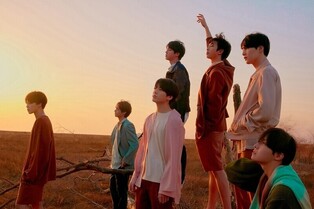(2nd LD) coronavirus-additional cases
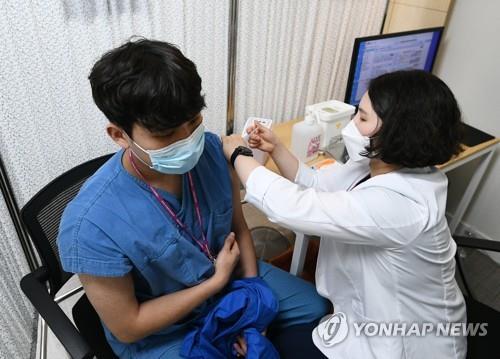 |
| ▲ A health worker gets a COVID-19 vaccine shot at the National Medical Center in central Seoul on March 20, 2021. (Yonhap) |
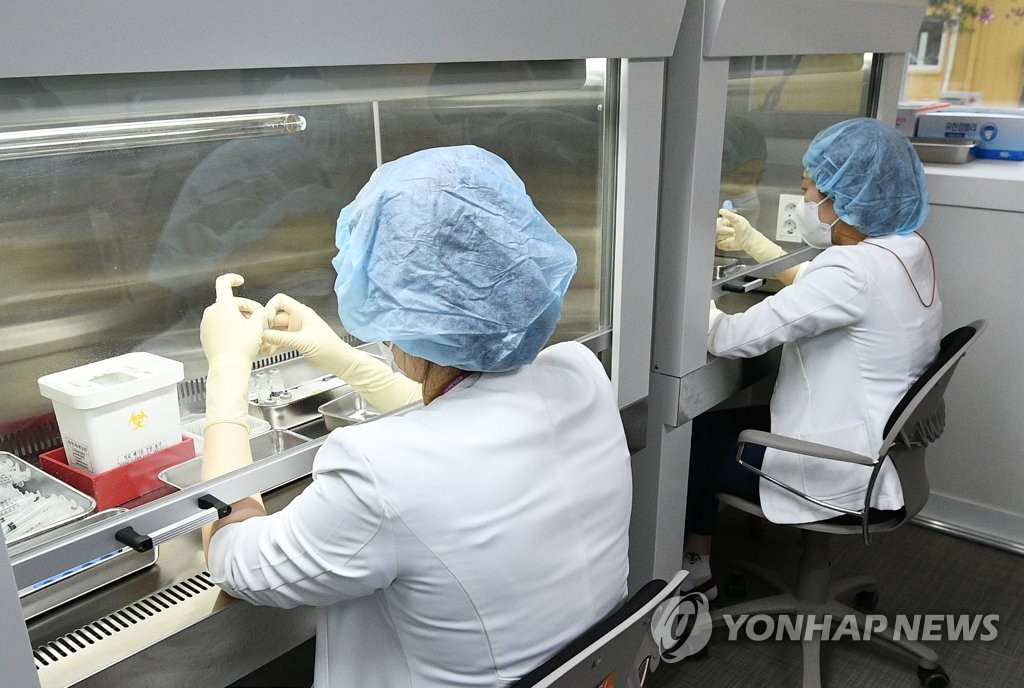 |
| ▲ Health workers prepare for COVID-19 vaccine injections at the National Medical Center in central Seoul on March 20, 2021. (Yonhap) |
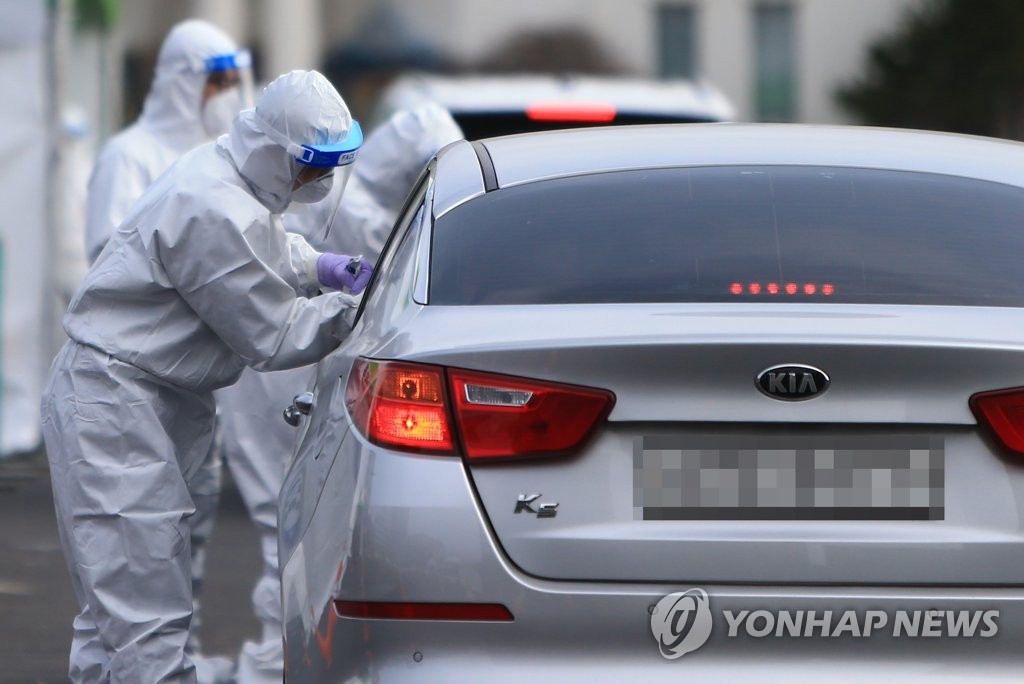 |
| ▲ Health workers conduct a drive-thru test for the new coronavirus at a public parking lot in Sokcho, Gangwon Province, on March 19, 2021. (Yonhap) |
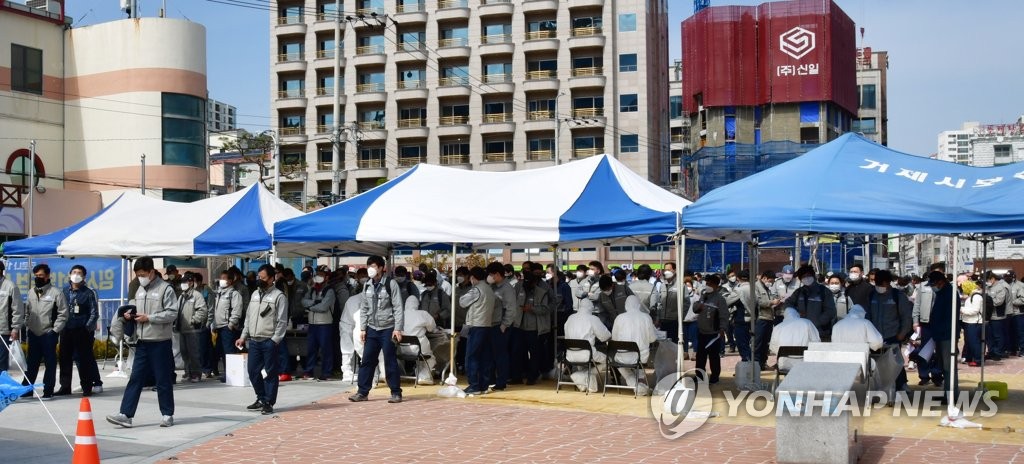 |
| ▲ This photo, provided by the city of Geoje, shows local residents standing in line to get tested for COVID-19 on March 19, 2021, after a cluster infection was reported. (PHOTO NOT FOR SALE) (Yonhap) |
(2nd LD) coronavirus-additional cases
(2nd LD) New virus cases in 400s for 4th day, concerns over resurgence during weekend
(ATTN: ADDS details in paras 12-16)
SEOUL, March 20 (Yonhap) -- South Korea's daily new coronavirus cases stayed in the 400s for a fourth day on Saturday, with continued sporadic clusters in the greater Seoul area adding to concerns over a resurgence in cases as more people go out during the weekend.
The country reported 452 more COVID-19 cases, including 440 local infections, raising the total caseload to 98,209, the Korea Disease Control and Prevention Agency (KDCA) said.
The country added three more deaths from COVID-19, increasing the total to 1,693.
The daily caseload was slightly lower from 463 on Friday. After rising up to the 600s in February, the figure had stabilized to as low as the 300s recently.
Daily new virus cases fell to the 300s on Monday and Tuesday on fewer tests over the weekend, but they rebounded to the 400s on Wednesday.
Despite extended preventive quarantine measures, clusters infections have shown no signs of letting up in the densely populated greater Seoul area, which is home to roughly half of the country's 52 million population.
The government earlier announced it will maintain virus curb measures that were set to expire on March 14 for another two weeks until March 28 to contain the virus's spread.
The greater Seoul area has been under the current Level 2 social distancing measures, the third highest in the five-tier curbs, since February. The measures include attendance caps at schools, religious activities and sports events.
In addition to the preventive measures, health authorities are expected to step up the AstraZeneca COVID-19 vaccine rollout as planned following the European Medicine Agency's (EMA) announcement that there is no evidence suggesting a correlation between the vaccines and blood clots found in some recipients.
The use of the vaccine has been suspended in more than a dozen European countries, including Germany, France and Italy, after reports of blood clots in people who received AstraZeneca products.
Two suspected cases of blood clots in South Korea have been reported after vaccination.
Regarding the case of a man in his 20s who suffered from blood clots after receiving the AstraZeneca vaccine, health authorities suspect "cerebral venous sinus thrombosis," a medical condition that the EMA said it will further look into.
Officials, however, stressed that the government is not considering changing its vaccination plan at the moment and will proceed with the plans set for the second quarter.
A total of 675,426 people, including 15,132 the previous day, have been given COVID-19 vaccine shots. This accounts for around 1.3 percent of the country's population and 84.4 percent of those who are advised to be vaccinated by the end of March.
AstraZeneca's vaccine accounted for 618,852, while Pfizer's took up 56,574. Starting Saturday, the government began a second round of shots for those who were inoculated with Pfizer vaccines. The second round of shots for AstraZeneca vaccines is expected to begin in late April.
There were 30 cases of people testing positive for COVID-19 after being vaccinated, health authorities noted, saying they likely contracted the virus before the vaccine went into effect in their immune systems. More than 40 percent of these cases occurred within one week of inoculation.
Under the country's vaccination program that started on Feb. 26, a total of 12 million people will be vaccinated by the end of June. Foreigners also will be inoculated under the program.
The country aims to achieve herd immunity by November.
A total of 9,757 cases of side effects after vaccinations have been reported, including 150 new cases. All but one of the 150 cases were mild.
A total of 16 deaths after vaccinations have been reported, with no additional deaths reported the previous day, according to the KDCA.
Of the 440 locally transmitted cases, 119 came from Seoul and 187 were reported from Gyeonggi Province that surrounds the capital. Incheon, 40 kilometers west of Seoul, reported 11 more cases. The three areas that make up the greater Seoul area accounted for 72 percent of all locally transmitted cases.
Sporadic clusters were reported in the metropolitan area, such as 20 cases linked to a bar and a restaurant in central Seoul and 10 related to a kindergarten in Yangju, Gyeonggi Province.
Outside of Seoul, 31 cases were confirmed in South Gyeongsang Province, where 63 have so far tested positive in relation to an adult entertainment facility in the southeastern city of Geoje.
The number of imported cases came to 12, down from 22 the previous day. Four of them were confirmed to be positive during quarantine procedures at airports and ports.
By nationality, four of them were Korean and eight were foreigners. The imported cases came from 10 countries, including Japan, Uzbekistan, France and the United States.
The number of patients with serious symptoms across the country reached 102, up from 101 the previous day.
The total number of people released from quarantine after making full recoveries moved up 426 to 89,949.
(END)
(C) Yonhap News Agency. All Rights Reserved






















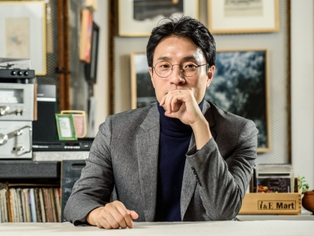






![[2026 Outlook] BTS, BLACKPINK comebacks; UNESCO World Heritage session in Busan fuel K-culture momentum](/news/data/20251226/p1065576816972067_337_h2.jpg)


